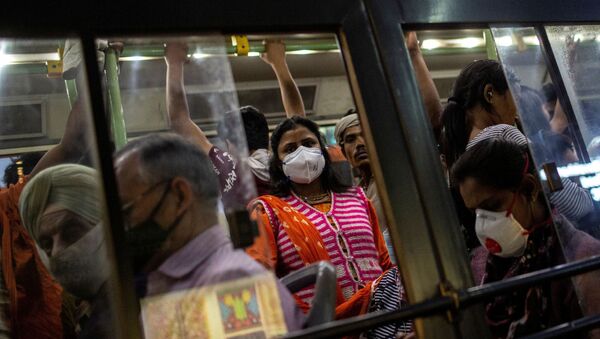As India braces for the second stage of the highly contagious viral infection, India's federal and state governments have announced several steps to arrest its spread.
Prime Minister Narendra Modi appeared on television to address the nation on Thursday evening, and said there was no room for complacency, despite the population-infection ratio in India being negligible. He said, the coming two weeks would be crucial to check the community transmission of the virus.
Here are some of the steps taken by the India's federal government to mitigate the spread of pandemic in the country.
- Banned all scheduled incoming international commercial passenger flights, beginning from 22 March for one week. New Delhi has already suspended "all existing visas, except diplomatic, official, UN/international organisations, employment, project visas" until April 15.
- Indian Railways cancelled over 400 low occupancy trains until March 31. The central and western railways also increased the price of platform tickets from $0.66 from $1.35 at a number of railway stations to discourage non-essential visitors.
- Public transport services have been shut down in various states including Jammu and Kashmir, Ladakh, Sikkim, Punjab, and parts of Maharashtra.
- The career-defining crucial board for the Class X and Class XII exams has been postponed until March 31.
- In New Delhi, gatherings of above 20 people has been banned. Delhi has also ordered the shutdown of restaurants. Only home delivery and takeaways are allowed.
- Both the federal and state governments have advised high-risk people - those over 70 and children below 10 - to remain indoors, except for emergencies.
- India’s northeastern state of Sikkim has banned the Indian army from entering the region, without screening. It has also banned entry people, including tourists, and migrant labourers from other Indian state and sealed three out of five entry points.
- Maharashtra in western India has recorded the highest number of cases with 44, followed by Kerala at 25, Uttar Pradesh at 18 and Karnataka 14. Mumbai is set to receive around 26,000 Indians arriving from Gulf nations between 19 and 31 March.
- After the Indian Army recorded its first COVID-19 case in Ladakh, the army suspended all training activities to contain the virus from spreading.
- India has set up a high-level panel - COVID-19 Task Force, headed by the federal finance minister, to take steps to mitigate the economic impact of the emergency.
- Almost all the major religious shrines have been shut until further notice.
Prime Minister Modi has asked citizens to observe a "Citizens Curfew" from 7pm to 9pm on 22 March as a mark of self-restraint.


